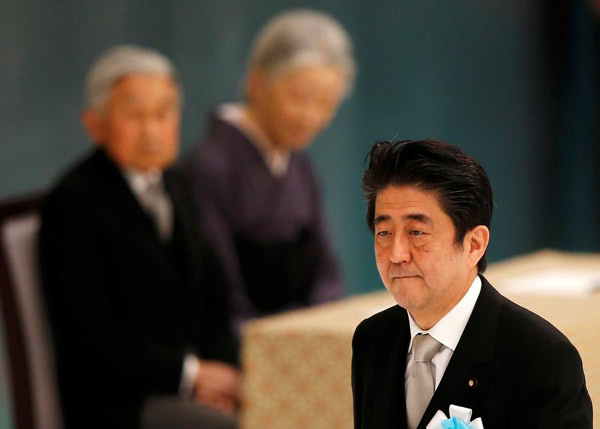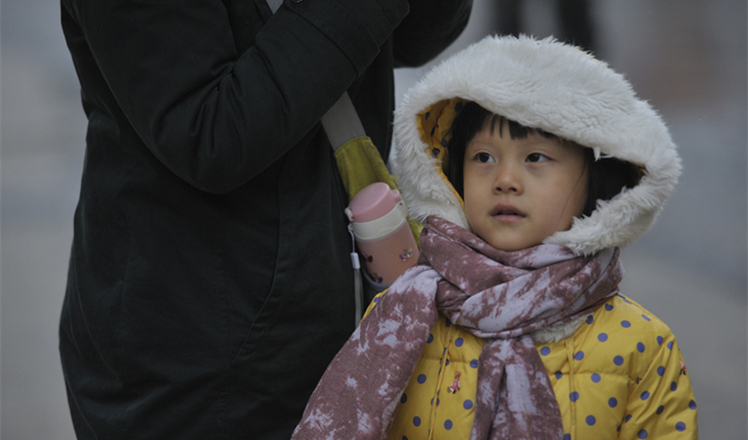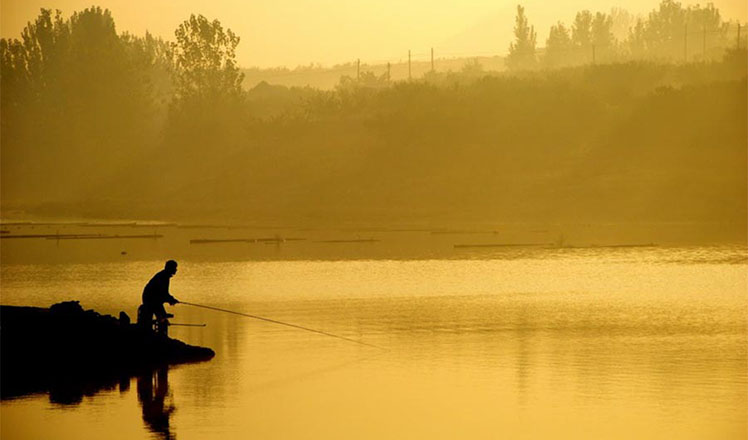Abe administration still dragging its feet over ratification of Paris pact
Updated: 2016-10-10 07:49
By Cai Hong(China Daily)
|
||||||||
 |
|
Japan's Prime Minister Shinzo Abe (R) walks past Japan's Emperor Akihito (L) and Empress Michiko during a ceremony marking the 70st anniversary of Japan's unconditional surrender in World War II at Budokan Hall in Tokyo, Japan August 15, 2015. [Photo/Agencies] |
With the world's fight against global climate change gathering steam, pressure is growing on Japan, the world's fifth-largest emitter, which has not ratified the Paris climate change treaty that will formally come into force on Nov 4.
As of Wednesday, 73 countries and the European Union, which account for more than 55 percent of global greenhouse gas emissions, had ratified the accord, meeting the threshold for the pact to take effect.
And on Wednesday, US President Barack Obama urged Japan and other nations that have not yet ratified the treaty to do so "as soon as possible".
The ratification of the treaty by China and the United States, the world's top emitters, has been hailed by campaigners as a major step forward in the global efforts to tackle climate change.
Yet Japan's Prime Minister Shinzo Abe did not mention the issue in his policy speech on Sept 26 when the extraordinary Diet session began. Deliberations in the Japanese parliament are focused on the issues such as endorsement of the Trans-Pacific Partnership trade accord.
The Japan Times has called on the Abe administration to promptly ratify the Paris treaty. The newspaper worries that Japan will be at a disadvantage if it delays ratification, as it would mean that Japan will not be able to sit at the negotiating table when the rules for the treaty's implementation are drawn up.
The Paris agreement dictates that a signatory will not be given voting rights in the making of rules for its implementation until 30 days have passed after the submission of ratification documents to the secretariat.
The countries that have ratified the pact will hold their first meeting during the COP 22 conference of parties to the United Nations Framework Convention on Climate Change in Marrakech, Morocco, on Nov 7-18.
The Paris deal commits any country that ratifies it to keep global temperatures from rising more than 2 C by 2100 with an ideal target of keeping the temperature rise below 1.5 C and for developed countries to give climate aid to their developing counterparts beyond 2020.
Compared with the more than seven years it took before the Kyoto Protocol came into force, it is taking less than a year for the Paris Agreement to take effect. This highlights the greater sense of urgency on the part of leaders of the major powers.
However, the Japan Times sees no such sense of urgency in Japan's lawmakers or the government, and the Mainichi Shimbun has criticized the Japanese government for being slow to go through the necessary procedures to ratify the Paris agreement.
Meanwhile, the Asahi Shimbun said that: "Betting that the pact would take effect around 2018, the (Japanese) government apparently opted to wait and see the moves of big emitters before deciding on its response."
It has become clear that human activities are the principal cause of the warming of the planet, which is believed by many scientists to be causing an increasing number of extreme weather events such as severe heat waves and destructive torrential rains.
A new study published in Nature Geoscience showed that the typhoons that have slammed into the coasts of East and Southeast Asia have become more violent, increasing in intensity by between 12 percent and 15 percent over the last four decades thanks to an overall warming of ocean surface waters in the Northwest Pacific.
Researchers have repeatedly warned that Pacific tropical cyclones and Atlantic hurricanes are likely to become more destructive. They call for preparing for future typhoons and reducing carbon dioxide emissions to curb warming.
Japan's ratification delay is clearly the wrong bet.
- Chinese tourists forced to sleep at airport for 5 days
- Saudi-led coalition denies striking funeral in Yemen's capital
- From bars to shops, seniors working in Tokyo
- Boat with some kids aboard capzised in San Francisco
- China urges G20 to implement Hangzhou consensus
- Trump hit by his own lewd remarks about women

 Egrets Seen in East China's Jiangsu
Egrets Seen in East China's Jiangsu
 Highlights of Barcelona Games World Fair
Highlights of Barcelona Games World Fair
 Coats, jackets are out as cold wave sweeps in
Coats, jackets are out as cold wave sweeps in
 6 things you may not know about Double Ninth Festival
6 things you may not know about Double Ninth Festival
 Double Nineth Festival: Can you beat these elders?
Double Nineth Festival: Can you beat these elders?
 Replica of Eiffel Tower glows in E China's Hangzhou
Replica of Eiffel Tower glows in E China's Hangzhou
 8 things you may not know about Cold Dew
8 things you may not know about Cold Dew
 Chinese designer's work shines at Paris Fashion Week
Chinese designer's work shines at Paris Fashion Week
Most Viewed
Editor's Picks

|

|

|

|

|

|
Today's Top News
Trump outlines anti-terror plan, proposing extreme vetting for immigrants
Phelps puts spotlight on cupping
US launches airstrikes against IS targets in Libya's Sirte
Ministry slams US-Korean THAAD deployment
Two police officers shot at protest in Dallas
Abe's blame game reveals his policies failing to get results
Ending wildlife trafficking must be policy priority in Asia
Effects of supply-side reform take time to be seen
US Weekly

|

|







